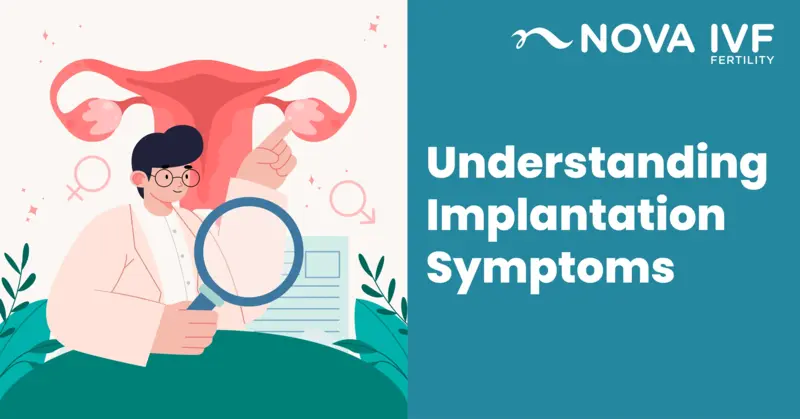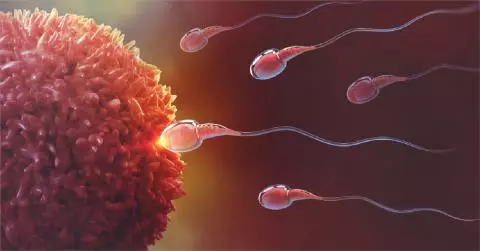Implantation Symptoms and Early Pregnancy Signs

Building a family can be as challenging as it is exciting. Women often track their menstrual cycles to figure out the best time for conception and keep an eye out for early signs of implantation. The time leading up to the tentative first date of your next period can be dreadful if you are trying to conceive. Being able to notice even a tiny sign of implantation can provide you hope.
Although all women who are pregnant may not realise it during the early stage of their pregnancy, some women notice early signs of pregnancy. These symptoms of implantation can include bleeding and cramping, which are quite similar to what a woman experiences during her menstrual cycle. However, there are slight variation in these symptoms from the menstrual ones.
Here is a comprehensive guide to help you understand when does implantation occurs, common symptoms of early pregnancy, and much more.
Understanding Implantation
Conception is a complex procedure that is made possible only if several small events, including ovulation, fertilisation, and implantation, among others occur successfully. Implantation is a significant part of conception process; let’s understand how it works.
Once the sperm fertilises the egg to make an embryo, the combined cells start multiplying rapidly to make a zygote. This zygote moves through one of the fallopian tubes to reach the uterine lining. The zygote needs to implant or attach itself to the uterine lining inside the wall of the uterus. The successful implantation of the zygote triggers the body to produce pregnancy hormones, including oestrogen, progesterone, or human chorionic gonadotropin (hCG). In case the implantation isn’t successful, the body sheds the uterine lining in the form of a menstrual period.
If the zygote is able to implant successfully in the uterine lining, the hormones released support the development of the foetus and the placenta and prevent the shedding of your uterine lining. This is essential to support a healthy pregnancy and prevent a miscarriage. The hormones released during this time period may feel like a nuisance sometimes.
Implantation Timeline
Implantation of the zygote can take place any time between 6-12 days after ovulation (release of a mature egg); usually it takes 8-9 days for implantation to occur. This makes it next to impossible to know exactly when it occurs. However, women may experience signs of early pregnancy in some cases.
Implantation in IVF
For couples who have undergone a form of Assisted Reproductive Technology (ART), the embryo is formed externally under favourable conditions in the laboratory. After the embryo is formed, it is cultured under observation to determine if it is healthy and has the potential to cause a successful pregnancy.
The next stage involves transferring the embryo into the uterine cavity where the embryo is expected to attach itself to the lining of the uterus after further development.
6 Common Symptoms of Implantation
The first sign of implantation is usually implantation bleeding which occurs 6-12 days post conception. Some of the common post implantation symptoms are listed below:
1. Light Bleeding or Spotting
According to the American College of Obstetricians and Gynaecologists (ACOG), light bleeding is an early pregnancy symptom that happens in about 15-25% of the pregnancies. Spotting or light bleeding is also referred to as a fertilisation symptom as it occurs approximately 1-2 weeks after fertilisation when the zygote implants itself in the uterine lining.
Oftentimes, spotting is one of the first signs of implantation as more blood vessels are developing in the cervix and it may bleed more easily during pregnancy. It is normal for women to experience spotting after a Pap smear test, sexual intercourse, or a pelvic exam.
2. Cramping
Some women may also experience light cramping as an implantation symptom. The hormonal changes are likely the reason behind cramping during implantation. Some women also report of feeling abdominal tenderness.
3. Swelling and Tenderness in Breasts
Implantation of the zygote triggers a rise in the levels of oestrogen, progesterone, and hCG. This increase can lead to tenderness in your breasts and swelling, and you may feel soreness as well. Women usually experience tender breasts before starting their periods, but this implantation symptom is more noticeable during early stages of pregnancy.
4. Mood Swings and Emotional Changes
Following implantation, the oestrogen, progesterone, and hCG levels are quite high. These hormonal fluctuations can cause mood swings during early pregnancy. You may feel extremely jolly in one moment and find yourself crying over a commercial about puppy food. Similar mood swings can be noticed before periods.
5. Temperature Dip
The basal body temperature of a woman keeps fluctuating slightly through her menstrual cycle due to hormonal fluctuations; for example, an increase of about 0.5-1°C can be noticed during ovulation. Similarly, a slight dip in basal body temperature may be noticed in women after implantation for a day. The temperature usually rises again the next day. Women who are planning a family or opting for ARTs usually take their temperatures regularly. Thus, they may be able to notice a change in their basal body temperature if they are experiencing it as an early sign of implantation.
6. Nausea
Often referred to as morning sickness, nausea is one of the most popular early pregnancy symptoms. The increase in progesterone after implantation is one of the reasons for the nausea that you may experience after implantation. However, most women experience nausea starting from the 4th or 5th week of pregnancy.
Progesterone can slow down your digestion, which may lead to nausea. Increasing levels of hCG are also considered responsible for enhancing your olfactory senses, which enhances your sense of smell and taste. This can make the situation worse and lead to aversion for certain types of foods.
Apart from the ones mentioned above, some women also experience acne, fatigue, bloating, headaches, or constipation as early signs of implantation.
Implantation symptoms in IVF
In case of IVF implantation, the symptoms experienced by the intended mother may not be as reliable as in natural pregnancies. The egg retrieval process can cause fluctuations in the hormones, which may lead to false implantation symptoms. If you have received a fertilised egg recently, you are advised to wait for about 10-14 days before taking an at-home pregnancy test and follow the guidelines issued by your IVF doctor.
How to Differentiate Implantation Symptoms from Premenstrual Symptoms?
As you are now aware that implantation symptoms can appear similar to menstrual symptoms. Here are a few things that you can do to distinguish between the two:
1. Inspect the bleeding
You may be able to distinguish menstrual bleeding from implantation bleeding as spotting caused by implantation is oftentimes light pink or brown in colour whereas menstrual bleeding is usually bright or dark red.
2. Notice the severity of the symptoms
These cramps are milder in severity in comparison to menstrual cramps. Other significant difference between menstrual and implantation cramps is that implantation cramps are localised on one side of the lower abdomen or back while menstrual cramps usually effect the entire lower abdomen, back, or thighs.
3. Observe the duration of symptoms
By noticing the duration of symptoms, you can gauge an idea whether your symptoms are related to early pregnancy or menstruation. The discomfort in breasts usually lasts a few days in case of periods, but it can be persistent in case of pregnancy. Implantation bleeding occurs for only a few hours or up to 2 days while menstrual bleeding, on the other hand, continues for 3-7 days.
When to Take a Pregnancy Test?
As most of the home pregnancy tests measure the hCG hormone in the urine, which increases after every 2-3 days of implantation. It can, however, take up to 3 or 4 weeks for a detectable amount of hCG to be released. The hCG levels in the blood and urine double almost every day since conception, peaking at about 10 weeks of conception.
A pregnancy test can be administered at home for a preliminary result on the 12th or 15th day after ovulation, which is about 26 to 29 days after the first day of your last period, in women who have a 28-day menstrual cycle. In case of IVF, a 2-week waiting period is generally recommended before taking an at-home pregnancy test.
The results of the at-home pregnancy test must be confirmed with the help of a blood test as the at-home tests may not always be reliable.
Managing symptoms of implantation
If you are experiencing severe implantation symptoms, it is best to consult a doctor. However, if the symptoms are bearable, you can consider taking it a little easy for 2-3 days. You might consider taking leave from your work if you feel like or avoid being harsh on yourself.
When to Consult a Healthcare Provider?
If you think your implantation symptoms are getting too severe, hindering your day-to-day tasks, or persisting for too long, you are recommended to consult with your doctor immediately. You must visit your doctor if you notice any of the following:
- Persistent fever
- Extreme pain in your abdomen
- Dizziness
- Excessive fatigue
Takeaway
The above-mentioned symptoms of implantation are often anecdotal in nature, which means that several women have reported experiencing these symptoms. Doctors have been able to establish the cause of only some of them till date.
It is important to remember that experiencing the implantation symptoms mentioned above doesn’t necessarily mean that you are pregnant. Additionally, the absence of the early pregnancy symptoms doesn’t necessarily mean that you are not pregnant. The early pregnancy experience of two different individuals can be completely different from one another.
Frequently Asked Questions About Implantation Symptoms
Q. What is the difference between implantation bleeding and a period?
A. The symptoms of periods are usually more severe in nature and last longer in comparison of implantation symptoms. You can learn about them in detail above.
Q. Why some women do not experience any noticeable implantation symptoms?
A. The common implantation symptoms are based on anecdotal evidence. Most women do not experience any symptoms during implantation. There is no clear explanation as to why some women experience implantation symptoms while others don’t.
Q. Can implantation occur without any signs?
A. Yes, although a significant event in conception, implantation is still happening at microscopic levels in your body as the zygote consists of only a few 100 cells. It is normal for women who are pregnant to not experience any early sings of pregnancy.
 Infertility Counselling
Infertility Counselling Female Infertility Treatment
Female Infertility Treatment Andrology Treatment
Andrology Treatment Fertility Enhancing Surgeries - Female
Fertility Enhancing Surgeries - Female Fertility Enhancing Surgeries - Male
Fertility Enhancing Surgeries - Male Endoscopy Treatment
Endoscopy Treatment IUI Treatment
IUI Treatment IVF Treatment
IVF Treatment ICSI Treatment
ICSI Treatment Advanced IVF Solutions
Advanced IVF Solutions Embryology
Embryology Vitrification Egg, Embryo, Sperm Freezing
Vitrification Egg, Embryo, Sperm Freezing Preimplantation Genetic Testing (PGT)
Preimplantation Genetic Testing (PGT) Donation Program Embryo / Egg / Sperm
Donation Program Embryo / Egg / Sperm Self-cycleTM IVF
Self-cycleTM IVF

 Self-cycleTM IVF
Self-cycleTM IVF









